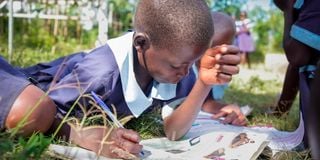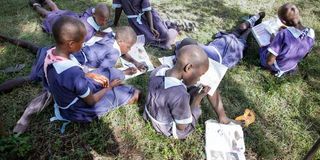
Pupils at Mboto Sunrise Primary School work on their competency-based curriculum assignment under a tree.
The financing problems that have recently plagued the basic education sector are likely to continue after the National Treasury retained almost the same amount of money allocated for capitation to learners in primary, junior and secondary schools despite pleas by stakeholders for more funding.
Whereas there is tinkering with the allocations to learners in the three sub-sectors, there is an insignificant change in the total amount when compared to the Teachers Service Commission (TSC) and the Technical and Vocational Educational and Training (TVET sector), which appear to be the biggest gainer in the 2024 Printed Budget Estimates.
The total capitation for learners in basic education in the current financial year is Sh103.4 billion. There is a marginal increase to Sh103.7 billion in the budget proposals.
The Free Primary Education (FPE) programme has been allocated Sh9.12 billion, down from Sh12.5 billion in the current financial year, while the Free Day Secondary Education (FDSE) programme allocation is Sh63.9 billion, down from Sh65.4 billion. Only the newest component of basic education, junior secondary school (JSS), has received an increase from Sh25.5 billion last year to Sh30.7 billion.
The justification for the cut of the FPE and FDSE is that primary school education has been reduced to two classes since Grades 7 and 8 are now in JSS, while secondary has lost one class to JSS.
Primary schools will receive more money since they host the JSS, which will have three classes from next year.
Under FPE, each learner is entitled to Sh1,420, while those in JSS get Sh15,042, and FPE receive Sh22,244.

Pupils of Mboto Sunrise primary school do their Competency-Based Curriculum assignment under a tree on September 29, 2022.
However, due to inadequate funding, lesser amounts reach the schools. The disbursement of the money is often delayed, leading to the institutions incurring debts to suppliers of goods and services.
Kenya Primary Schools Heads Association, Kenya Secondary Schools Heads Association, and Teachers Unions have previously called for increased and timely capitation to reflect current economic reality.
As the government gears up for the roll-out of Grade 9, the last class of JSS, Sh2.8 billion has been allocated for infrastructure in primary, secondary and JSS, a drop from the Sh6 billion in the current budget.
The printed estimates are generated from the Budget Policy Statement and will now be processed by relevant departmental committees of the National Assembly. The committees can make proposals to the Budget Appropriations Committee for changes in the sectors that they oversight.
The TSC hogs much of the education sector budget after being allocated Sh352.5 billion, a significant rise from the current Sh316.7 billion.
The government has promised to recruit 20,000 more teachers, while thousands of tutors who have stagnated in the same job groups have been demanding promotions.
The TVET sector has made huge gains in the printed estimates that will see its allocation rise from Sh0.98 billion to Sh20.1 billion. Other allocations to the sector include Sh7.7 billion for capitation and scholarships for TVET students, an increase of Sh2.5 billion and 2.3 billion for the construction and equipping of Technical Training Institutes.
TVET students will also benefit from the Sh22.1 billion earmarked scholarships for university and TVET students under the higher education funding model. This is only applicable to students who will be in their second year and first year of study from September.
The scholarships will be managed by the Universities Fund, where students are awarded scholarships based on their needs after evaluation using the Means Testing Instrument.
University education has been allocated Sh63.8 billion, a drop from the Sh97.5 billion in the current budget. This includes capitation.
The Higher Education Loans Board allocation is up from Sh30.3 billion to Sh32.9. The funds finance student loans on a needs basis.
Research, science, technology and innovation have received an allocation of Sh1.05 billion, up from Sh0.749.









